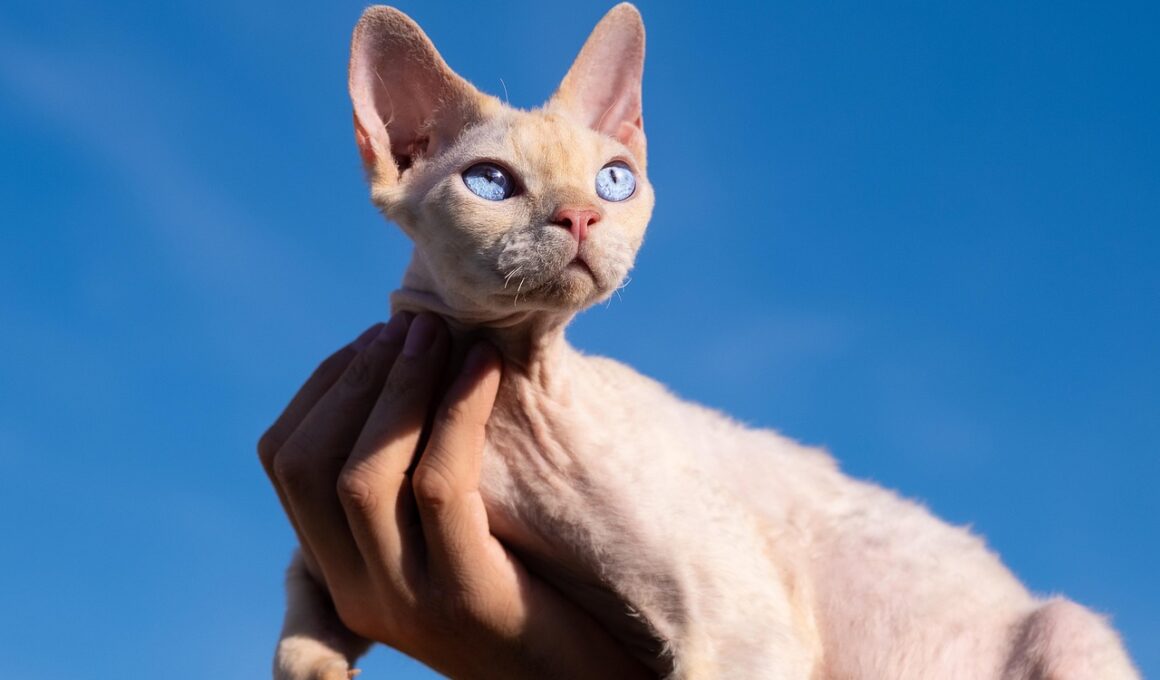The Devon Rex Cat’s Coat: Care and Maintenance
The Devon Rex cat is known for its unique, soft, and curly coat, which sets it apart from other breeds. This distinct texture is due to a genetic mutation that affects the hair follicles. Most owners find the coat easy to maintain, making it a delightful choice for many cat lovers. The fur is short and requires less grooming than long-haired breeds. Nevertheless, regular brushing is essential to remove loose hair and prevent matting. Owners should ideally plan for brushing sessions at least once a week. This practice ensures that their Devon Rex remains comfortable and healthy. Additionally, bathing should be considered every few months, as their skin produces more oil than other cats. Bathing can help manage the oil build-up and keep the coat looking vibrant and fresh. Always use a mild cat shampoo to avoid skin irritation. Due to the unique structure of their coat, ear cleaning is also important. Regular checks can help avoid build-up of dirt and wax, which is essential for their overall hygiene.
Essential Grooming Tools
When caring for the Devon Rex coat, specific grooming tools can be beneficial in maintaining its health. Essential items for routine care include a soft-bristle brush, rubber grooming mitt, and cat shampoo. A soft-bristle brush gently removes loose hairs, keeping the coat smooth without causing discomfort. The rubber grooming mitt is perfect for casual bonding while grooming, as it stimulates the skin and distributes natural oils. Using specially formulated cat shampoo is crucial as it helps maintain the skin’s natural moisture balance. This minimizes oil production and promotes a healthier coat. In cases where the Devon Rex does develop mats or tangles, a comb can be incredibly helpful. Always be gentle when removing knots to avoid harming the cat’s delicate skin. It’s best to work slowly to ensure your pet remains comfortable throughout the grooming process. Depending on the cat’s activity level, grooming frequency may vary from weekly to bi-weekly. Exposing kittens to grooming early on can make them more accepting of the process as they grow older.
The Devon Rex is not only unique in coat texture but also in its charming personality. These cats are known for their playful and mischievous demeanor, making them delightful companions. They thrive on interaction, often seeking out their owners for attention. Understanding their personality can aid in providing the best environment for them. When a Devon Rex is comfortable, it demonstrates affectionate behavior and is often involved in household activities. Providing stimulating activities is crucial as it can help in managing their energy levels and promotes healthy exercise habits. Toys, puzzle feeders, and supervised outdoor play are great options. Incorporating playtime into your daily routine can significantly enrich their lives. Additionally, they are highly social creatures, so a household with multiple pets can also be beneficial. However, they enjoy individual attention too. Create a space where your cat can observe and engage with the family, such as a cozy perch or window seat. This allows them to feel part of the family dynamics while indulging in their curious nature. Familiarizing yourself with their behavior patterns can create a stronger bond.
Benefits of Regular Bathing
Bathing your Devon Rex is essential in maintaining the integrity of their unique coat and skin. Regular bathing can control excess oil production, which is more common in this breed. By using a gentle cat-specific shampoo, you help cleanse the coat without stripping it of essential oils. Keeping the coat clean prevents skin irritations and ensures that your cat remains comfortable. Bathing also reduces allergens, which is beneficial for those prone to cat allergies, as the coat traps dander. A routine bathing schedule, typically every six to eight weeks, is advisable, depending on the activity level. If your Devon Rex tends to get dirty often, adjust this schedule accordingly. Be sure to dry them thoroughly post-bath to prevent chilling, especially in colder months. Use a soft towel or a low-heat blow dryer on a safe setting. After bathing, a gentle brush can help in styling the coat back to its signature curly form. This overall regimen supports healthy skin while enhancing the bond between owner and pet. A clean pet is not only more pleasant but healthier.
Seeking professional grooming services for your Devon Rex can be beneficial, especially for busy pet owners. Professional groomers understand the specific needs of this breed. They can provide exceptional care and maintain the coat’s distinct characteristics. They are equipped with specialized tools and products designed to preserve coat integrity while ensuring a pleasant experience for your cat. During visits, the groomer can also check for any underlying skin issues that might not be apparent at home. Some owners may find it necessary to have their cats groomed more frequently, particularly if they are active or prone to getting dirty. Groomers can also do a thorough cleaning of the ears, which is crucial given the breed’s susceptibility to wax buildup. If you are unsure about how to manage your Devon Rex’s grooming routine, consult with the groomer. They can provide recommendations and best practices tailored to your cat’s unique coat and needs. Establishing a good relationship with a reliable groomer can make all the difference in maintaining your pet’s overall happiness and health.
Diet and Its Impact on Coat Health
The diet you provide to your Devon Rex plays a crucial role in their overall coat health. High-quality nutrition contributes to a shiny and healthy coat, making it vital to choose the right food. Foods rich in omega fatty acids encourage skin hydration, ultimately preventing dryness or flakiness. Look for cat food that lists real meat as the first ingredient and contains natural vitamins and minerals. Consulting with your veterinarian can help determine the best diet suited for your cat’s age and activity level. Ensure that the cat’s diet comprises wet and dry food for balanced hydration and dental health. Supplements can also be beneficial, especially those containing fatty acids. However, consult your vet before introducing new supplements as not all cats may require them. Fresh water should always be available to keep your cat hydrated—dehydration can affect skin and coat health. Regular feeding schedules help keep their metabolism steady, contributing to overall well-being. Pay attention to their weight as obesity can impact coat condition and mobility over time.
Monitoring your Devon Rex’s skin and coat condition regularly is important for maintaining their health. Regular inspections help identify any changes that may indicate underlying issues. Some common problems could include excessive shedding, dryness, or changes in coat texture. If you notice any persistent issues, consulting with a veterinarian is advisable. They can provide essential feedback on whether it’s a dietary concern, a hormonal imbalance, or more serious conditions. Skin allergies can also manifest as patchy fur or irritation. Understanding your cat’s skin condition helps establish a baseline, making it easier to identify abnormalities. Checking your cat’s ears is equally important—look for redness, swelling, or discharge. Regular grooming indicates healthy skin and gives you an opportunity to investigate any problems early. Additionally, working closely with your vet can also help in crafting a comprehensive care plan tailored to your Devon Rex’s specific needs, including grooming schedules, dietary recommendations, and general health checks. Prevention is key in avoiding more serious health issues that may arise from neglecting grooming routines.


